by Kevin Shaw | photos courtesy of Playhouse on the Square
“When you change the way you look at things; the things you look at change.”-Wayne Dyer
When I first saw Playhouse on the Square’s production of Memphis back in May of 2016, I couldn’t have been more impressed. The music, choreography and performers were so invigorating that, when I left the theatre that night, not only was I incredibly proud of the talent this city has to offer, but also the city of Memphis itself. Per the tagline for the show, the city of Memphis is billed as the “Birthplace of Rock ‘n’ Roll!” Rather than getting caught up in debating the historical accuracy of that statement, I took solace in feeling pride that this musical was a story about a white disc jockey in Memphis having the courage to not only play “black” music on a “white” radio station with great success back in the 1950’s, but also about said
“white” DJ falling unapologetically in love with a “black” singer and the two of them rocking and rolling together (at least for a while) all the way to national stardom.
At the time, Memphis, to me, was a “feel good” musical—it showcased great music and dancing, a disgraceful, but accurate storyline about segregation in the south, all while being presented with great execution. Although the show featured a strong commentary on the social injustices in the not so distant past (1950’s), it felt like we, as a country, had at least, maybe, slightly started turning a corner by 2016. Perhaps? After all, we were in the eighth year of Obama’s presidency, and while I’m in no way suggesting that the bigots and racists in this country during the Obama years had “seen the error of their ways” and renounced their prejudices, they had seemed to have at least gotten the message to not be so open about it. It felt like this country had started making “some” progress. My, how times have changed.
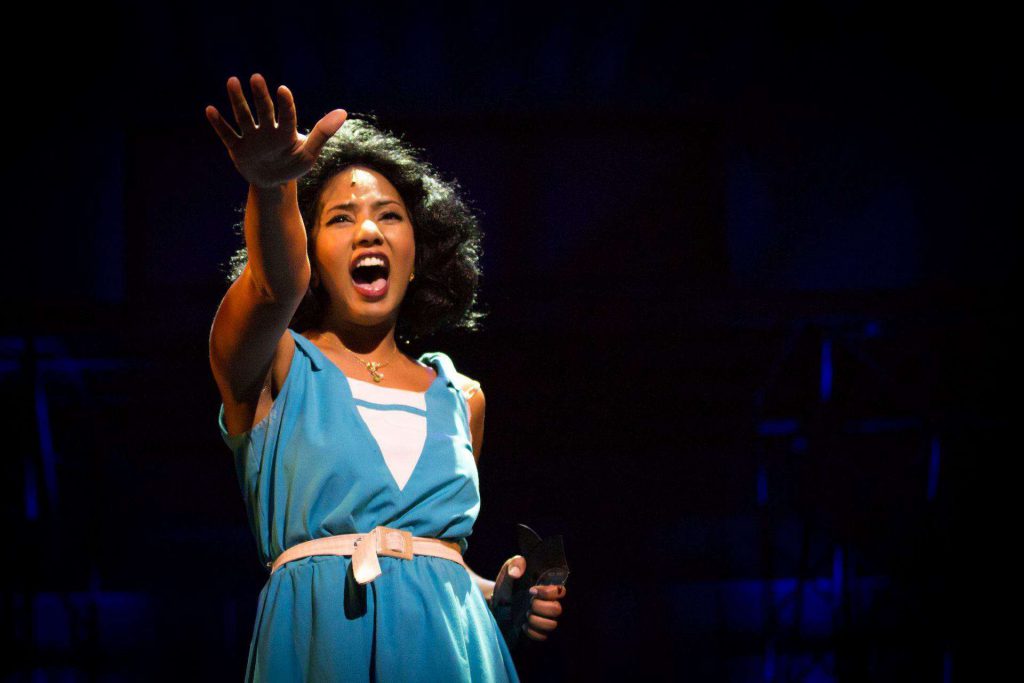
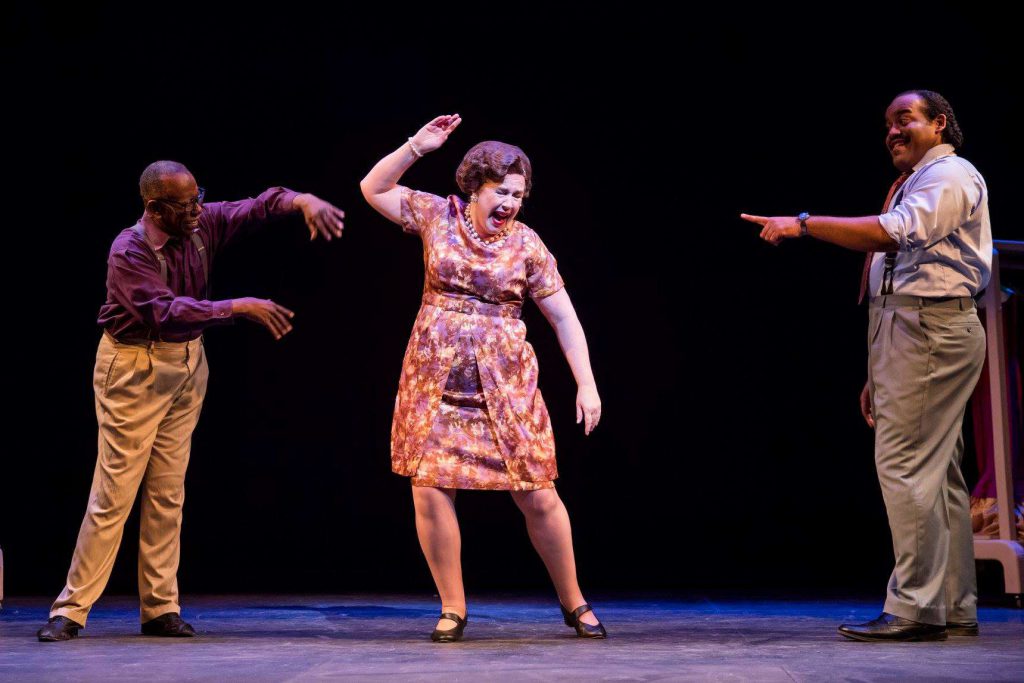
Maybe it’s just me, but I would like for a freakin’ show set in the 1950’s to feel like a PERIOD PIECE—not like current history! Ever since Trump made it okay to be a proud and loud bigot again, this 2019 rendition of Memphis at Playhouse on the Square has disastrously reverted to being a cautionary tale rather than an unimaginable stain on our nation’s past. Just to be sure I wasn’t overreacting, I asked my 14-year-old daughter yesterday two questions: 1) Daughter, would you be shocked if you heard our neighbors down the street owned African-American slaves? Her answer was an emphatic “Yes, that would be unbelievable!” 2) Daughter, would you be shocked if you heard our white neighbors down the street disowned their son for dating a black woman? Her answer was, “That would be kinda weird, but no, not really.” This is not progress. Rather than being able to put the social ignorance of our history on the backburner for a couple of hours and simply celebrate and enjoy the music and love that Memphis has to offer, one can’t help but feeling sickened at the reminder that this country is shimmying in the wrong direction again.
Co-Directors/Choreographers, Jordan Nichols and Travis Bradley have brought back a large portion of the very talented cast from the successful 2016 production, and this cast is just as strong and engaging, including a few remarkable additions. Lena Horne lookalike, Dawn Bradley, makes her Playhouse on the Square debut as the female lead, Felicia, who quickly rises from Memphis club singer to superstardom in a role that superbly showcases, not only her singing, but her acting chops. She never over or underplays her character’s journey that is met with difficult men at every turn. Jarrad Baker is back from his successful 2016 turn in the role of club owner, Delray (Felicia’s brother) who only wants what’s best for his sister in a dangerous white world and it’s easy to understand and sympathize why he feels the need to be so protective, and yet, misunderstood. John Hemphill returns as the radio station manager, Mr. Simmons, who hates “black” music until the “green” starts rolling in. He perfectly underplays a man who seems to hate people, change, his job, etc. and spends his days trying to keep it all under control with minimal success. His continued bewilderment, met with exasperation, is hilarious. Jenny Odle Madden is a new addition to the cast as the racist mother of Huey Calhoun who can’t understand her son’s desire to stretch their intimate world’s mores. It’s not until Act II that she begins to “see the light” and her metamorphosis into acceptance is a religious experience—not only for her, but the entire audience. Justin Allen Tate continues to turn heads this theatre season with another knockout performance as Gator, the mute bartender who only speaks when absolutely necessary. He doesn’t say much, but you dare not listen when he’s ready to be heard. Similarly, just like it’s impossible to not close your eyes when you sneeze, it’s impossible to not smile when you see Curtis C. Jackson back again in the role of Bobby, the radio station janitor who often (but not often enough) breaks into song and dance. He simply exudes joy onstage. If he’s not having fun, no one’s having fun!
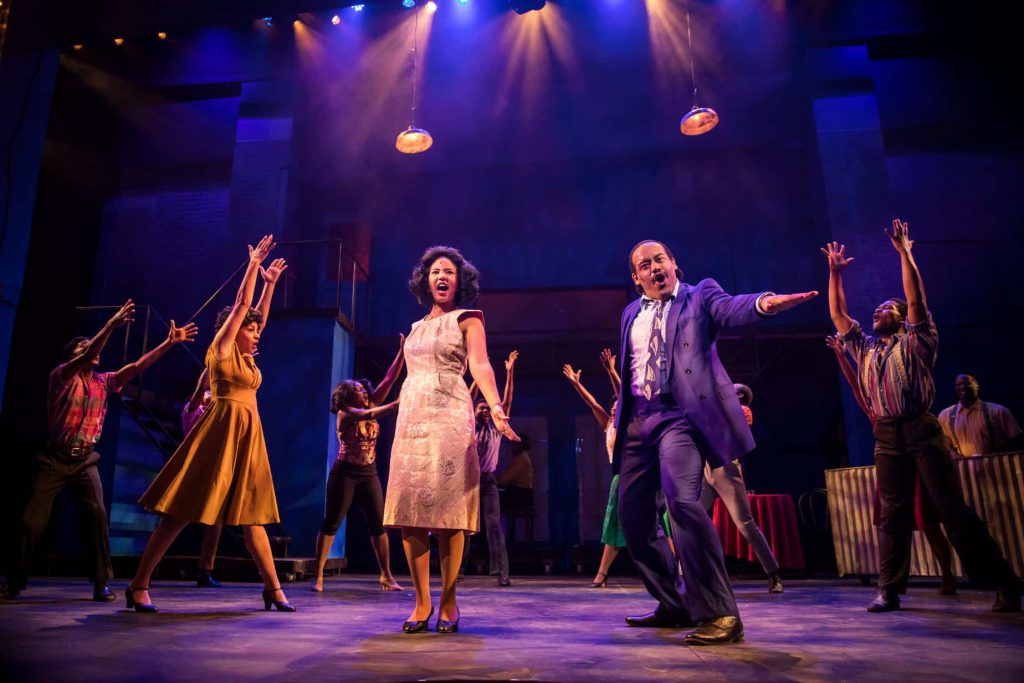
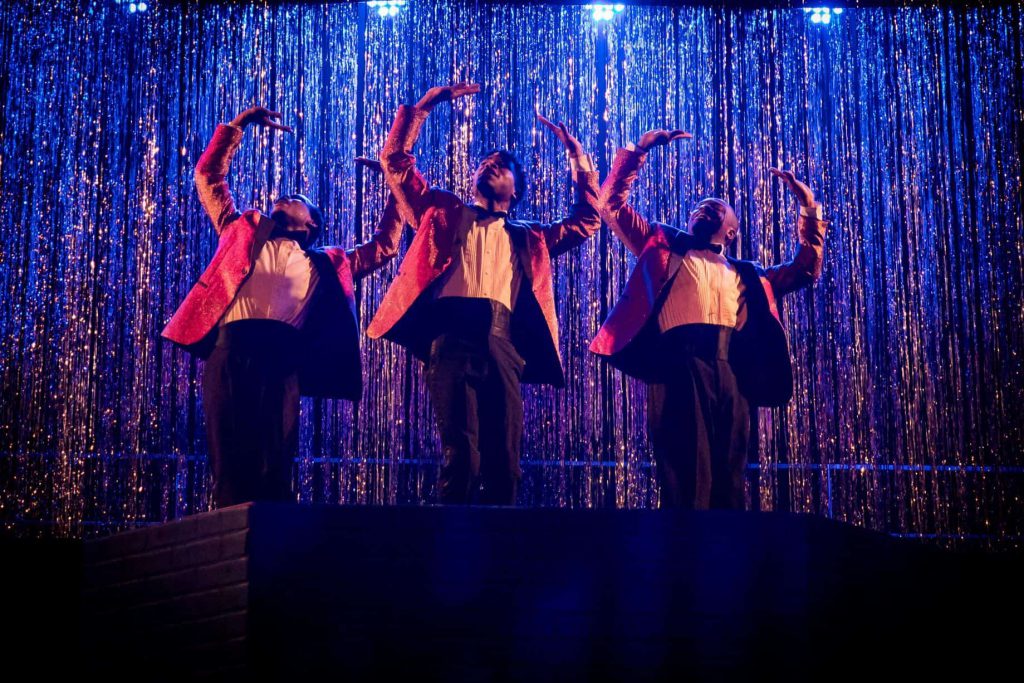
Finally, Nathan McHenry returns in the starring role of Huey Calhoun, the white disc jockey who starts playing black music on a white radio station and creates a phenomenon. Whether it’s as the Emcee in Cabaret or the useless, TV-loving father in Matilda, the Musical, McHenry always throws himself 110% into the role he’s playing and I would venture to say he’s one of the most underrated performers in Memphis this past year. Once again, he’s back (all in) as a man who doesn’t understand why anyone has to see or care about the color of another person’s skin or self-regulate their love of a certain type of music. What you see, is what you get with McHenry’s Calhoun which seemed to work better back in 2016 than it does in 2020. In Obama’s world, McHenry’s choices for Calhoun made him seem carefree, eccentric, but harmless. In Trump’s world, these same choices now appear as foolish, dangerous and bordering on utter cluelessness. How could this character not realize the reaction he might receive from the patrons of an all-black nightclub when entering? How could this character (who grew up in Memphis in the 1940’s and 50’s) not realize his mother would have a coronary when she discovers him with a black woman in her kitchen? The 2016 election has transformed these very same acting choices from “three-dimensional quirky” to “two-dimensional nonsensical.” There are moments towards the end of the show when McHenry shows differing layers of the character, but too often he relies on being “goofy” (which doesn’t help play up his attractiveness as a potential love interest for Felicia) and leaves the audience wanting more range. Please understand, McHenry can sing, dance, play the piano and act his butt off, but his choice as an actor to “aw shucks” his way through social unrest seems misplaced.
When I was a very young performer in a musical, one of the leads told me he wasn’t talented enough to be in the ensemble. At first, I thought he was making a joke, but he was dead serious. He went on to say that he didn’t have the talent to sing or dance as well as most people who make it into the ensemble and I now I know what he meant. A strong ensemble member is a great singer AND a great dancer (and maybe even a great actor), while most leads in musicals are usually just (but not really just) strong singers or actors. Memphis has a strong ensemble of singers and dancers and when they dance, their energy is so infectious, you’ll want to get up and dance with them—I say, go ahead!
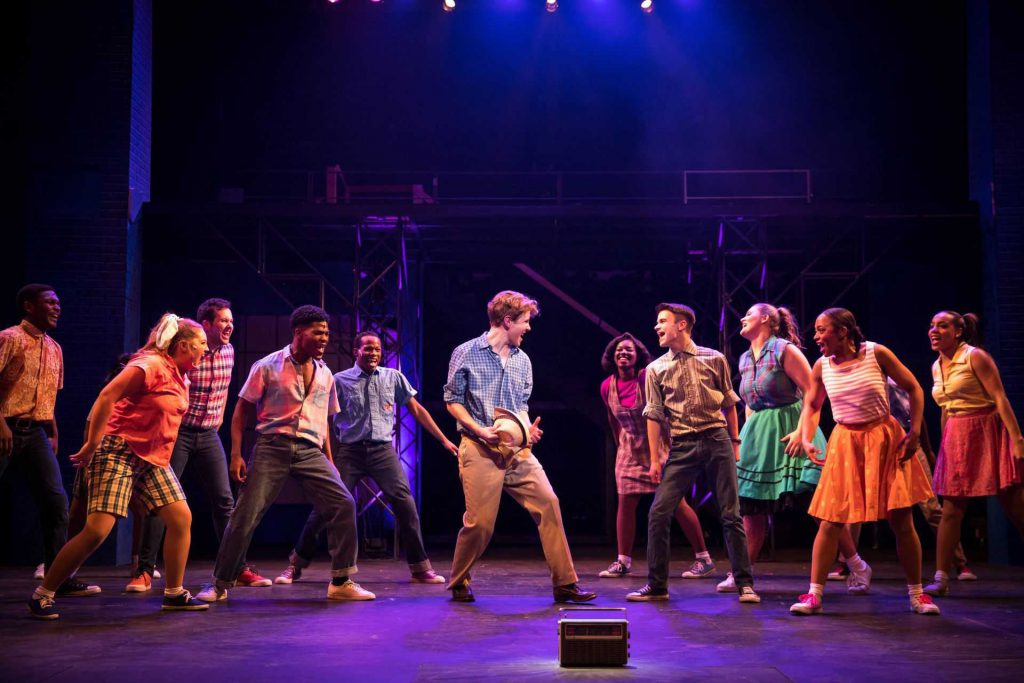
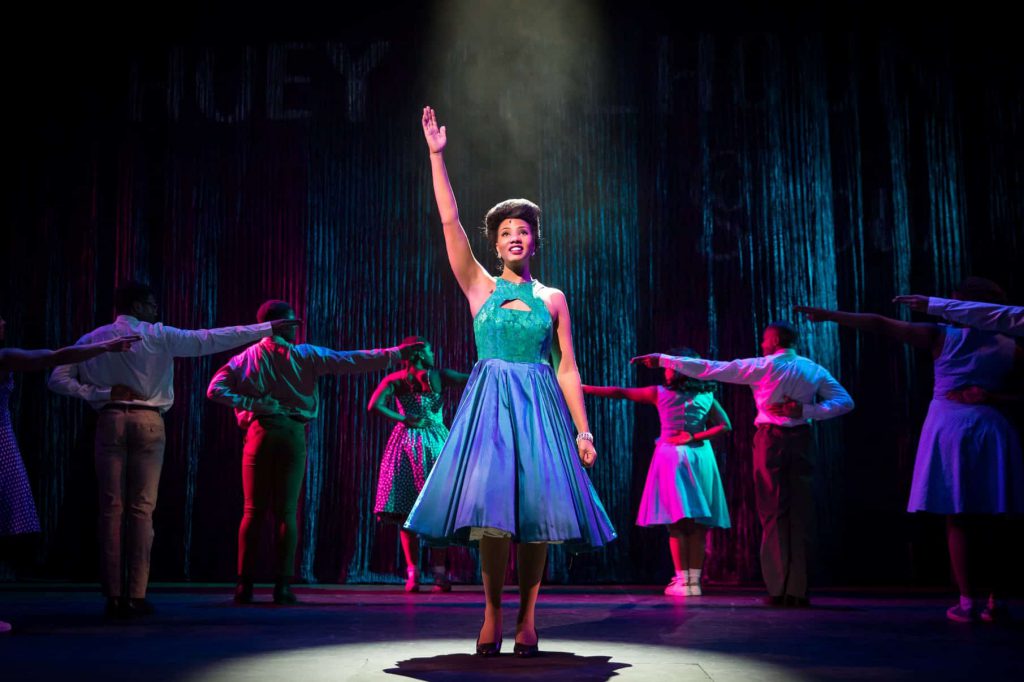
Angelo Rapan leads a top-notch orchestra showcasing a rich, full theatre-encompassing sound. Kathleen R. Kovarik’s costumes flowed, splayed and sparkled throughout and Justin Gibson’s lighting provided just the right ambience throughout to set the perfect mood. Overall, this is one of Playhouse’s most technically strong shows in a while and it helps elevate Memphis to a grand night of entertainment.
Whether you saw the 2016 production at Playhouse or not, you’ll still find plenty to love about this version. It’s a solid production all around that will leave you feeling uplifted at the end. Yes, it showcases the ugly side of, not only Memphis, but America and it’s a side that just seems to refuse to fade away, but, if you can, try and focus on the joyfulness, spirit and energy of the music and dance. Memphis has had a turbulent history, but it’s also had a glorious one. Each of us has seen many different aspects (good and bad) of this city and, for those who have chosen to stay awhile, we’ve found an energy that seems to just keep us here. If you’re like me, it’s still something to be proud of and you’ll probably find yourself humming your new personal anthem as you leave the theatre-“Memphis Lives in Me.”
GRADE: A
Now through February 8, 2020
http://playhouseonthesquare.org/



